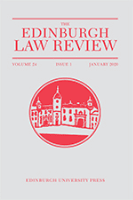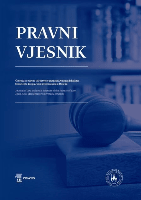
Edinburgh Law Review
Scope & Guideline
Advancing legal scholarship at the crossroads of culture and history.
Introduction
Aims and Scopes
- Scottish Law and Legal Reform:
The journal consistently addresses developments in Scottish law, including legislative changes, judicial decisions, and proposals for reform, providing insights into the evolving legal landscape in Scotland. - Comparative Legal Studies:
Many articles explore legal principles and practices in a comparative context, allowing for a broader understanding of Scottish law in relation to other legal systems, particularly those in the UK and Europe. - Public Law and Human Rights:
The journal frequently publishes on issues of public law, including administrative law, constitutional matters, and human rights, reflecting a commitment to discussing the legal frameworks that govern public policy and individual rights. - Commercial and Corporate Law:
There is a notable focus on commercial and corporate law topics, including insolvency, contract law, and corporate governance, which are vital for practitioners and academics involved in business law. - Emerging Legal Issues and Technology:
Recent publications indicate an increasing interest in the intersection of law and technology, particularly regarding digital markets, artificial intelligence, and data privacy, showcasing the journal's responsiveness to contemporary challenges.
Trending and Emerging
- Digital Law and Regulation:
There is a significant increase in publications addressing the legal implications of digital technologies, including data privacy, cybersecurity, and digital markets, highlighting the growing importance of legal frameworks in the digital age. - Human Rights and Social Justice:
The journal has seen a rise in articles exploring human rights issues, particularly in the context of social justice movements, indicating a commitment to addressing legal challenges faced by marginalized groups. - Administrative Law and Accountability:
Recent themes emphasize the role of administrative law in ensuring government accountability, especially in light of responses to crises such as the COVID-19 pandemic, reflecting a broader interest in governance and public law. - Intersection of Law and Health:
There is an emerging focus on legal issues related to health, particularly in the context of public health crises, healthcare rights, and legal frameworks governing health policies. - Climate Change Law:
The journal is increasingly addressing legal responses to climate change, indicating a growing recognition of environmental issues within the legal discourse and the need for robust legal frameworks to address these challenges.
Declining or Waning
- Historical Legal Analysis:
There has been a noticeable decline in articles focused solely on historical legal analysis, suggesting a shift towards contemporary legal issues and practical applications rather than historical exploration. - Theoretical Legal Scholarship:
Theoretical discussions on legal philosophy and jurisprudence seem to be less prevalent, indicating a possible trend towards more practical and applied legal studies that address current societal issues. - Family Law:
Topics specifically centered on family law, such as divorce and child custody, have been less frequently featured, which may reflect a broader societal focus on other pressing legal matters. - Environmental Law:
Despite the importance of environmental issues, there appears to be a waning focus on environmental law topics compared to previous years, possibly due to an increased emphasis on other areas such as technology and digital governance. - International Law:
The journal has seen a reduction in articles dedicated to international law topics, suggesting a potential narrowing of focus towards domestic legal issues over international legal frameworks.
Similar Journals

SOUTHERN CALIFORNIA LAW REVIEW
Your Essential Resource for Legal ExcellenceSouthern California Law Review is a prestigious academic journal published by the University of Southern California, focusing on the expansive field of law. With an ISSN of 0038-3910 and a continuous publication record since 1973, this journal has established itself as a vital platform for legal scholarship and discourse. It holds an impressive Q1 ranking in the law category for 2023 among academic journals, reflecting its significant impact and reputation within the legal community. The journal encompasses a wide array of topics designed to foster rigorous debate and critical analysis, making it a crucial resource for researchers, practitioners, and students alike. Although currently not open access, it consistently aims to provide in-depth scholarly articles that contribute to the development and understanding of law across various dimensions. As it continues to evolve until 2024, Southern California Law Review remains an essential resource for anyone committed to exploring the nuances of legal theory and practice.

GEORGE WASHINGTON LAW REVIEW
Navigating the Complexities of LawThe George Washington Law Review, ISSN 0016-8076, published by George Washington University, stands as a leading academic journal in the field of law, distinguished by its prestigious Q1 category ranking in Law for 2023. Established as a pivotal platform for legal scholarship, the journal reflects a deep commitment to advancing legal discourse through the publication of rigorous, thought-provoking articles and analyses. The journal's impact is further underscored by its Scopus ranking, placing it in the 72nd percentile within the Social Sciences category for law, showcasing its relevance and influence in legal academia. While not an open-access journal, it contributes significantly to legal research and education, making it invaluable for scholars, practitioners, and students seeking to engage with contemporary legal issues. Its comprehensive coverage since 1976 ensures a wealth of resources dedicated to evolving legal thought and practice, solidifying its role as an essential resource within the legal community.

OSGOODE HALL LAW JOURNAL
Exploring Contemporary Legal Issues with DepthOsgoode Hall Law Journal, published by the renowned York University Osgoode Hall Law School, serves as a vital platform for legal scholarship in Canada. With a commitment to advancing knowledge in various fields of law, this journal publishes a broad range of articles, case studies, and critical analyses that address contemporary legal issues. While specific impact factors and indexing metrics such as H-Index and Scopus Ranks are not available, the journal's long-standing reputation and contributions to legal education make it an essential resource for researchers, legal practitioners, and students alike. Although it does not offer Open Access options, readers can access its content through libraries and subscriptions, ensuring the dissemination of high-quality legal research. The journal's aim is to foster robust dialogue among legal scholars and practitioners, thereby shaping the future of legal discourse in Canada and beyond.

De Jure Law Journal
Connecting Researchers and Practitioners in Legal Studies.De Jure Law Journal, published by Pretoria University Law Press, is a reputable open access journal that has been serving the legal community since its establishment in 2011. With its commitment to disseminating high-quality research, this journal focuses on various aspects of law and legal principles, encompassing a broad range of topics from constitutional law to international legal frameworks. The journal's ISSN 1466-3597 and E-ISSN 2225-7160 ensure that it is easily accessible and widely recognized in academic circles. Positioned as a significant contributor to legal scholarship in South Africa and beyond, De Jure Law Journal is dedicated to fostering a critical dialogue among researchers, practitioners, and students alike, making it an essential resource for anyone engaged in legal studies.

German Law Journal
Bridging Tradition and Innovation in LawGerman Law Journal, published by Cambridge University Press, stands as a leading open-access platform for scholarly discourse in the field of law, having made its content freely available since 2019. With an impressive impact factor that places it in the Q1 category for Law as of 2023, and a robust Scopus ranking of #164 out of 1025 in the social sciences category, this journal is recognized for its high-quality research and significant contributions to legal scholarship. The journal encompasses a wide array of topics pertinent to the German legal system, European Union law, and comparative legal studies, thus catering to researchers, legal practitioners, and students alike. Located in the heart of the UK, at Edinburgh Building, Shaftesbury Rd, Cambridge, this journal not only fosters academic engagement but also promotes interdisciplinary dialogues that enrich the understanding of legal principles in an evolving global context. Emphasizing accessibility and high academic standards, the German Law Journal serves as an essential resource for those seeking to explore and contribute to contemporary legal discussions.

Pravni Vjesnik
Fostering Discourse in Law and Society.Pravni Vjesnik is a peer-reviewed academic journal published by the Pravni Fakultet Sveučilišta Josipa Jurja Strossmayera & Osijek, primarily focusing on the field of law within the social sciences. Since transitioning to an Open Access model in 2016, the journal has broadened its accessibility, allowing researchers, professionals, and students to engage with diverse legal scholarship without subscription barriers. With an ISSN of 0352-5317 and an E-ISSN of 1849-0840, Pravni Vjesnik plays a crucial role in disseminating knowledge and fostering discourse in the legal community, particularly within the context of the Croatian legal system and broader European legal frameworks. Although it holds a rank of #760 out of 1025 in the Scopus database, placing it in the 25th percentile of law journals, its commitment to quality and relevance ensures its importance as a resource for rigorous academic inquiry. The journal's scope is anticipated to expand from 2019 to 2024, promoting ongoing research in contemporary legal issues. This dedication to publishing comprehensive and impactful studies makes Pravni Vjesnik an essential platform for those involved in the legal field.

UNIVERSITY OF NEW SOUTH WALES LAW JOURNAL
Championing Innovative Legal Research Since 1983University of New South Wales Law Journal, published by the University of New South Wales, Faculty of Law, is a leading academic journal that serves as an essential platform for discourse in the field of legal studies. With an ISSN of 0313-0096 and an E-ISSN of 1839-2881, the journal has been a beacon of legal scholarship since its inception in 1983. Operating from Kensington, New South Wales, Australia, it provides profound insights into various legal issues, emphasizing interdisciplinary perspectives by also being recognized in the fields of philosophy, sociology, and political science. While it maintains a Q3 ranking in Law and has shown increased visibility in Philosophy at Q2 according to the 2023 category quartiles, the journal assures a diverse range of critical analyses from scholars, professionals, and students alike. It is particularly valuable for researchers seeking to engage with contemporary legal debates, ensuring they remain at the forefront of academic and practical discussions in law and related disciplines.

Melbourne University Law Review
Showcasing Innovative Ideas in Legal PracticeMelbourne University Law Review, published by the MELBOURNE UNIV LAW REVIEW ASSOC, stands as a pivotal journal in the realm of legal scholarship in Australia and beyond. With an ISSN of 0025-8938 and an E-ISSN of 1839-3810, this esteemed publication has been a cornerstone for legal discourse since its inception. Designed to foster rigorous analysis and extensive debate, the journal covers diverse aspects of law, providing researchers, practitioners, and students an invaluable platform to engage with contemporary legal issues. The journal has demonstrated a commitment to high-quality scholarship, achieving a Q2 ranking in Law for 2023, further solidifying its importance within the academic community. Although not an open-access publication, the Melbourne University Law Review ensures that contributions remain accessible through institutional subscriptions, enhancing its reach and reinforcing its role as a critical resource for those dedicated to advancing legal knowledge and practice. For all stakeholders in the field of law—be they established academics or emerging professionals—this journal serves as a vital repository of innovative ideas and legal analysis.

CATHOLIC UNIVERSITY LAW REVIEW
Illuminating Legal Issues with a Distinctive Perspective.CATHOLIC UNIVERSITY LAW REVIEW is a premier legal periodical published by the Catholic University of America Press, located in the heart of Washington, D.C. with a dedicated focus on the intersections of law, education, and religious studies. Since its establishment in 1973, the journal has served as a critical platform for scholarly discourse, presenting innovative legal analysis and thought-provoking research that caters to scholars, practitioners, and students alike. With an ISSN of 0008-8390, this non-open access journal holds a notable place in the academic community, reflected by its category quartiles in 2023, ranking Q4 in Education and Law, and Q3 in Religious Studies. The Catholic University Law Review is distinguished not only by its commitment to advancing legal scholarship but also by its dedication to exploring the implications of law through a distinctly Catholic lens. Its consistent output of high-quality articles contributes to ongoing debates and developments in these fields, making it an essential resource for those interested in the legal implications of contemporary issues.

Insolvency Law Journal
Navigating the complexities of insolvency law.Insolvency Law Journal, published by LawBook Co Ltd, is a pivotal resource within the field of insolvency law and related disciplines. With a commitment to fostering scholarship and discussion on critical issues surrounding insolvency practices and legal frameworks, this journal serves as an essential platform for researchers, legal practitioners, and students alike. While currently not offering open access, the journal ensures the dissemination of high-quality research and case studies that contribute to the broader understanding and application of insolvency laws. Its authoritative content is enriched by an experienced editorial board dedicated to maintaining rigorous academic standards, thus promoting insightful analyses and innovative solutions to contemporary insolvency challenges. With an increasing global emphasis on effective insolvency regimes, the Insolvency Law Journal occupies a significant niche by illuminating emerging trends, shaping policy discussions, and enhancing legal education. Readers can expect detailed articles covering a diverse range of topics within the realm of insolvency law, making it a valuable addition to any legal scholar's library.